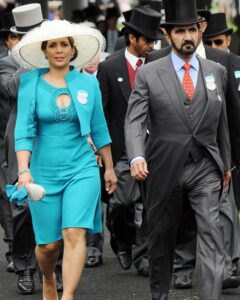Tony Allen-Mills
July 7, 2019, The Sunday Times
With the unexplained death of the crown prince of Sharjah and the impending divorce of Dubai’s ruling couple, the secretive Arab dynasties are in the spotlight

To his friends in London he was known simply as Khalid, a hard-working, hard-partying fashion designer with an £8m penthouse overlooking Hyde Park. To his family in the tiny Gulf emirate of Sharjah, he was Sheikh Khalid bin Sultan Al Qasimi, heir to an Arab dynasty steeped in Islamic culture.
The extraordinary double life of Sharjah’s 39-year-old crown prince was under intense scrutiny last week after the discovery of his body at his Knightsbridge home on Monday amid lurid reports of “drug-fuelled sex orgies”.
It proved, however, to be merely the prelude to a terrible week for the billionaire rulers of the United Arab Emirates, who appear increasingly torn between traditional lifestyles and the seductions of the West.

Among the visitors offering their condolences to Khalid’s father, Sheikh Sultan bin Muhammad Al Qasimi, was another emirati ruler with reasons of his own to despair over the cultural divide between London and the Gulf.
Sheikh Mohammed bin Rashid Al Maktoum, ruler of Dubai, friend of the Queen and one of Britain’s best-known racehorse owners, has been forced to turn to the UK courts for what may prove one of the most expensive — and ugliest — divorce cases in British legal history.
The domestic disturbances afflicting two of the Arab world’s wealthiest families have pierced the veil of privacy that usually surrounds the Gulf sheikhs. They also underline the fundamental contradiction that has long been clear in the Harley Street clinics and private rehab resorts that counsel unhappy Arab wives or help the “rich kids” of the Gulf overcome addictions to drugs, alcohol or sex.
“They come to London to do stuff they can’t do at home,” one counsellor said.
In the past, visitors from restrictive Arab countries have resorted to desperate measures to “have fun” in London while away from their families. Some young women insist on oral or anal sex only, so that they will appear virgins to future husbands back home.
One account in Grazia magazine described a partying Saudi Arabian “leading the charge doing shot after shot of tequila in a nightclub. But when she gets home? She’s not even allowed her own set of house keys — all the better for her parents to monitor her movements.”
High-living Arab princelings are best known for roaring around Knightsbridge in supercars, but they have also proved vulnerable to more mundane vices. London police are awaiting the results of toxicology tests on Khalid’s body and have not yet confirmed reports that drugs were found in his penthouse. Khalid’s older brother Mohammed was 24 when he died from a heroin overdose at the family’s estate in East Grinstead, Surrey, in 1999.
Khalid was portrayed by Gulf-based media last week as a “poetic and perceptive design mind” who had built a successful fashion label, Qasimi. He was often photographed at catwalk shows, casually dressed in jeans and T-shirt with his arm round beautiful models. Born in Sharjah but educated at Tonbridge School, Kent, he studied fashion design at Central Saint Martins college in London but offered few clues about his background to his business colleagues.
His profile was very different in Sharjah, where local newspapers mostly portrayed him in national dress and made no mention of his party-going London lifestyle.

Sharjah has long been one of the strictest emirates in enforcing Islamic law, with alcohol largely banned and homosexuality and sex outside marriage illegal. Nor did local media mention last week that Khalid’s company, QSM Fashion, reportedly had debts of £3.7m, according to accounts filed in September last year.
Meanwhile Maktoum, 69, has been plunged into a vicious public battle with his 45-year-old Jordanian wife, Princess Haya, who is also friendly with the Queen and is believed to have taken refuge in the family’s £85m mansion in Kensington Palace Gardens in London.
The couple were married in 2004, but Haya, the sister of Jordan’s King Abdullah, had to share her husband with his official first wife, Sheikha Hind, with whom he has at least 12 children. There are reportedly at least four other unofficial wives.
Sources close to the family last week spoke of deep divisions between Haya and Hind.
While Haya was the “outward” face of the family, highly polished and presented to the world as a shining example of equality and modern Middle Eastern womanhood, the other wives stayed behind closed doors and were rarely, if ever, recognised in public. Haya is an Oxford University graduate and she shared a love of horses with Maktoum; she is an accomplished equestrian who represented Jordan at the 2000 Sydney Olympics.
The court proceedings follow a series of reported disputes over successive attempts by two of Maktoum’s daughters by his first wife to escape the family’s control. Several sources claim that princesses Shamsa and Latifa were both kidnapped and returned to Dubai against their will.
Haya’s role in the saga remains murky. In a bizarre poem posted on Instagram, Maktoum accused an unidentified woman of “treachery and betrayal”, warned that “the era of your lies has ended” and concluded: “I do not care if you live or die.”
What prompted Haya to flee Dubai and take over the family mansion in London remains unclear. The Jordanian royal court has remained silent on the affair. The capital, Amman, has deep links with the UAE and cannot risk a diplomatic crisis that could cut off a crucial source of aid.
Haya has retained Baroness Shackleton, a prominent divorce lawyer whose past clients have included the Prince of Wales and the Duke of York; Maktoum will reportedly be represented by Helen Ward, who negotiated Guy Ritchie’s split from Madonna and the divorce of the Formula One boss, Bernie Ecclestone, from his second wife, Slavica.
Contacted by The Sunday Times last week, several members and associates of the emirati royal families said they had been pledged to silence on the Maktoum affair. Two said they could not talk as they feared for their safety.
But London court proceedings loom, and, barring what could be a very expensive settlement, there may be many more stories that Gulf media will be unable to report.